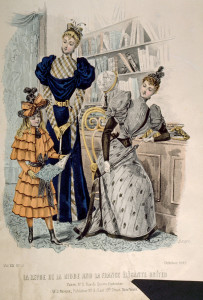Though a “governess” may sound like someone you’d only find in a nineteenth-century British novel, they do still exist. Governesses are a specialized subset of nannies, whose position focuses primarily on a child’s educational development.
Historically, a governess was a middle-class single woman who would come into an upper-class or aristocratic home to educate and look after the girls and young boys. Her position was a lonely one; she was neither a part of the family nor a servant. Many mothers feared that their children preferred the governess (because she spent so much more time with them) and thus would ignore her after work hours. The governess occupied a tense space in which she needed to be able to assuage these fears without directly acknowledging their existence or neglecting her duties.
She was most often tasked with teaching “the three R’s” (reading, writing, and arithmetic), as well as the genteel, ladylike “accomplishments” expected of aristocratic young women (speaking another language, playing a musical instrument, painting, or writing poetry, among others).
In certain ways, today’s live-in nanny bears impressive resemblance to the governesses of the nineteenth century. According to Governess: The Lives and Times of the Real Jane Eyres by Ruth Brandon, a recent survey taken of British families with nannies found that “65% rated fluency in a second language, a knowledge of first aid and the ability to teach creative drawing and art more important than a professional child-minding qualification, while 10% also sought the ability to play and teach a musical instrument.”
One might consider this an evolution of expectations. Over time, the nanny industry has become a desirable career path, and its practitioners now need more specialized knowledge and training to make themselves competitive. What passed for a governess two centuries ago is now what many families expect from a nanny. Today’s governesses need to have full education credentials and certifications in addition to several years of experience in both education and childcare.
Families who choose the services of a governess do so for a variety of reasons. They may need the flexibility to travel without affecting the quality of their child’s education, or they might live in a remote area. Some families hire governesses in addition to regular schooling; these women are often seen as specialized tutors, who provide extra instruction in both a child’s regular academic subjects as well as extracurricular learning, such as French or piano. Families who enlist the help of governesses often require a tailored curriculum for their children, and/or a level of personal security that outside schooling is unable to provide.
Similarly, women who choose a career as a governess cite the chance to have a large impact on a child’s development and intellectual upbringing, the relative freedom in the pacing of the child’s education, and the potential for travel as some of the position’s many advantages.
If this sounds like your ideal work environment, or a position your family needs to have on staff, the best way to become or find a governess is to use a reputable governess agency. With a governess agency, families can trust that each candidate has the education level, verifiable references, and experience necessary for such a high-stakes position, and candidates can trust that the families take their position seriously and appreciate the significant impact a qualified, professional in-home educator can have on a child’s education. Start your search today!

